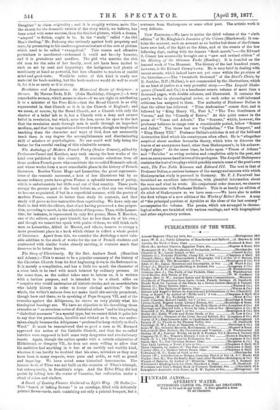The Story of Christianity. By the Rev. Andrew Reed. (Hamilton
and Adams.)—This is meant to be a popular summary of the history of the Christian Church from its first beginning down to the Reformation. It is merely a compilation, and has a little too much the character of a cram book to be read with much interest by ordinary persons. At the same time, as the author takes care to inform us, it is written with a further purpose, and is intended to be a check alike on "sceptics who would undermine all historic truths, and on sacerdotalists who falsify history in order to foster clerical ambition." On the whole, the writer's animus does not make itself obtrusively prominent, though here and there, as in speaking of Pope Gregory TH. and of the crusades against the Albigenses, he shows us very plainly what his theological leanings are. We have no objection to his describing those crusades as "an atrocious series of diabolical crimes "and to his printing "diabolical massacre " in a special type, but we cannot think it quite fair to say that the persecution, horrible and wicked as it was, was under- taken simply because the Albigenses "professed to keep strictly to God's Word." It must be remembered that so good a man as St. Bernard approved the action of the Catholic Church, and that the so-called heretics were supposed to hold some very dangerous and revolutionary tenets. Again, though the author speaks with a certain admiration of Hildebrand, or Gregory VU., he does not seem willing to allow that his ambition had anything in it but of an earthly and worldly kind, whereas it can hardly be doubted that his aims, mistaken as they may have been in many respects, were pure and noble, as well as grand and impo-ing. We have noted some historical inaccuracies. The famous At-oh of Titus was not built on the occasion of Titus's triumph, but subsequently, in Domitian's reign. And the Elder Pliny did not perish by falling into the crater of Vesuvius, but suffocation under a


































 Previous page
Previous page